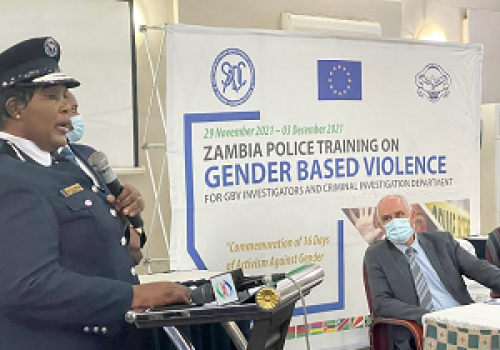Zambia has become the first Southern African Development Community (SADC) Member State to benefit from a Gender Based Violence Training Guideline approved by SADC Ministers responsible for Gender/Women's Affairs in August 2021 which is centred on strengthening the capacity of law enforcement agencies to address GBV, Ms. Kealeboga Moruti, Senior Officer, Public Security at the SADC Secretariat, has said.
Speaking at the opening of a training workshop for GBV for the Zambia Police Services (ZPS) which coincided with the commemoration of 16 Days of Activism Against GBV in Lusaka, Zambia, on 29 November 2021, Ms. Moruti said the Training Guideline is intended to be used as an overarching framework in the development of detailed training curricula for law enforcement which may be adapted based on country specific laws, policies and procedures.
Ms. Moruti said the training is a reflection of ZPS's commitment and dedication to the fight against GBV, and urged participants from different parts of Zambia to share data, experiences on best practices and challenges on the ground as this informs the policy narrative, programming and response.
She said the training is aligned with the SADC blueprints that explicitly speak to the elimination of GBV in the Region and the provision of coordinated, effective and timely services to victims of violence. These blueprints -- Vision 2050, Regional Indicative Strategic Development Plan 2020-2030 (RISDP), SADC Protocol on Gender and Development, and the SADC Regional Strategy and Framework of Action for Addressing GBV (2018-2030) -- underscore capacity and skills building for first responders.
Ms. Moruti said the presence of police, the judiciary, civil society organisations and the media at the workshop was evidence of a multi-sectoral response to GBV because no single entity can win this battle alone.
Speaking on behalf of ZPS Inspector General Mr Lemmy Kajoba, Deputy Inspector General, Ms. Doris Nayame, said the training was important as it was taking place during the commemoration of the 16 Days of Activism against GBV.
Ms. Nayame said ZPS through the Victim Support Unit (VSU), is a key beneficiary of the Government of Zambia-United Nations Joint Programme on GBV which seeks to establish an integrated and multi-sectoral mechanism for the implementation of activities which contribute to reducing GBV.
The support received from this project continues to enhance service delivery in communities, and among activities worth noting in phase two of this project is the support towards the development of training modules on GBV for police recruits and in-service trainees and the support to the forensic laboratory at police headquarters.
She acknowledged the support from German development agency, GIZ, through the programme for legal empowerment and enhanced justice delivery programme, whose focus is improving justice delivery for all and accelerating respect for human rights; and the support administered by the multi-partner trust fund under the office of the United Nations Development Programme (UNDP) and the European Union (EU) funded programmes.
Ms. Nayame said the gruesome reports of GBV which continue to be reported countrywide highlight the vulnerability of women and girls as victims of GBV. She said there is a need for prompt response to GBV cases to enforce laws in order to protect victims, and that it was necessary that front desk officers, VSU officers, crime scene officers and criminal investigators collaborate whenever a report of GBV is reported.
Mr Ernest Lungu, Assistant Director Gender Rights Protection Department in the Gender Division of the Zambian Cabinet Office, said his government is cognisant that development cannot be effective in an environment of high prevalence of GBV, and that citizens, especially women and girls, cannot fully enjoy their rights in situations of high prevalence of GBV.
He said GBV is heinous because it hurts the victims' bodies, minds and hearts; prevents them from equal participation at the personal, social and political levels, and also reinforces other forms of discrimination, including those based on disability, age and HIV status.
The Zambian government, he said, wants to ensure that strong measures are put in place to prevent GBV from occurring in the first place and to mitigate its impact on the survivors and those who might be affected in one way or another. One of the measures is to ensure that survivors have access to justice in a timely and effective manner.
The government has provided an enabling environment by putting in place policy and legal framework to combat gender inequality, the bedrock of GBV as well as deal with GBV itself. The government is in the process of reviewing the national gender policy and the supporting legislation such as the Anti-Gender Based Violence Act in view of the changing environment and the need to respond.
Over the years the Zambian government, working with stakeholders, has directed its efforts into strengthening the national referral system by supporting operations of the one-stop centres, establishing shelters or safe houses for survivors and fast-tracking courts on GBV. It is also training police officers and prosecutors on GBV; introducing an economic empowerment initiative in the care package for survivors of GBV; and raising awareness on the scourge of GBV at community level.
The workshop was made possible through the 11th European Development Fund-backed Support to Peace and Security in the SADC Region (SPSS) Programme aimed at promoting peace, security, stability and democracy across the SADC Region.

